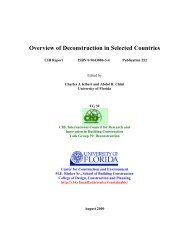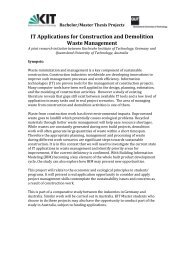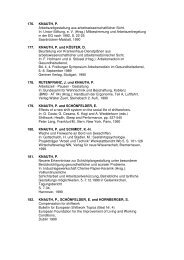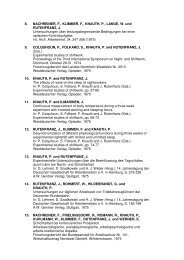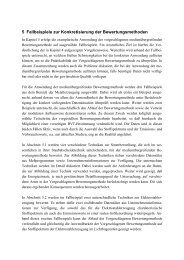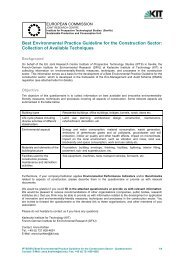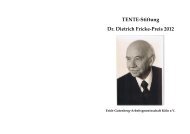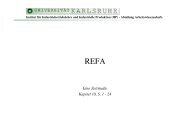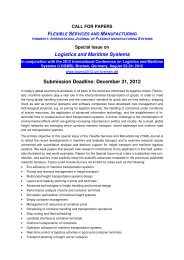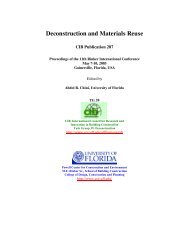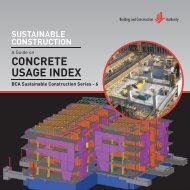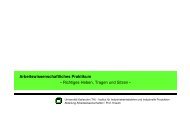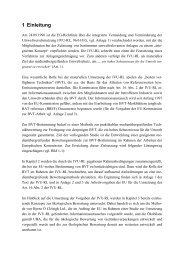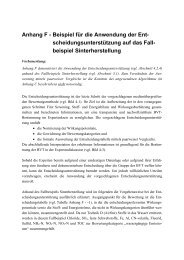Waste reduction final report -4 - Test Input
Waste reduction final report -4 - Test Input
Waste reduction final report -4 - Test Input
You also want an ePaper? Increase the reach of your titles
YUMPU automatically turns print PDFs into web optimized ePapers that Google loves.
In this chapter, an overview on Swiss construction activities as well as on flows and stock<br />
estimates was established. Switzerland is a small country and space for construction activities<br />
as well as for landfills is scarce. A peak in house building was reached between 1961 and<br />
1975 with 60 Mm3 (115 MT) of new constructions per year on average. But still, new<br />
constructions hold most expenditure, especially in house building. Swiss underground<br />
constructions are mainly built or planned; the demolition rate will remain more or less<br />
constant in future.<br />
Gravel is the most used material in construction engineering. Gravel stocks in Switzerland are<br />
huge, but exploitability is lowered by different constraints. Besides gravel, concrete is the<br />
most important construction material. In house building, its fraction has been rising over the<br />
last century. The two materials are dominating civil engineering, too. More than half of all<br />
materials are stocked in road networks.<br />
We will now focus on waste emerging from the construction sector.<br />
Legislation and legal binding guidelines/standards<br />
This chapter intends to give an overview on construction waste related laws and standards in<br />
Switzerland. After a short description of the legal structure, underlying laws for handling<br />
construction waste are presented. Coincidentally, some notions will be clarified with the help<br />
of definitions given in laws, regulations and standards. A short discussion on possibilities of<br />
the federal state to influence construction waste handling will be hold in the end of this<br />
chapter. In this sections, parts of the CIB <strong>report</strong> 318 (section Switzerland) have been restated<br />
[CIB 2008].<br />
Switzerland consists of 26 federal states named “cantons” all of which have their own<br />
constitution, parliament, government and courts. The political system is therefore<br />
decentralised with a lively direct democracy. The National Government consists of the<br />
bicameral parliament (legislative), the Federal Council (executive) and the Federal Court<br />
(judicial). Switzerland does not belong to the European Union (EU), but has signed many<br />
agreements with the EU and its states. The National Government is responsible for issuing<br />
laws while their execution lies in the responsibility of the cantons. Additionally the states and<br />
municipalities have their own more specific laws and regulations on waste management,<br />
whereas national law has more power than these laws. The Federal Office for the<br />
Environment FOEN tries to standardise the application by issuing numerous guidelines. In<br />
addition private organizations such as the Swiss Association of Engineers and Architects<br />
(SIA) issued standards, which partly have an obligatory character.<br />
Legislation<br />
In this section, a short description of the current laws concerning construction waste<br />
management and important articles is given. Please consult the annex for the wording of the<br />
mentioned articles in the Swiss legislation (several parts only in German). Swiss laws and<br />
regulations are available in the four national languages 26 on www.admin.ch in the classified<br />
compilation of federal legislation. Please note that selected legal texts exist in English.<br />
Legal status<br />
26 German, French, Italian, Romansh<br />
88



